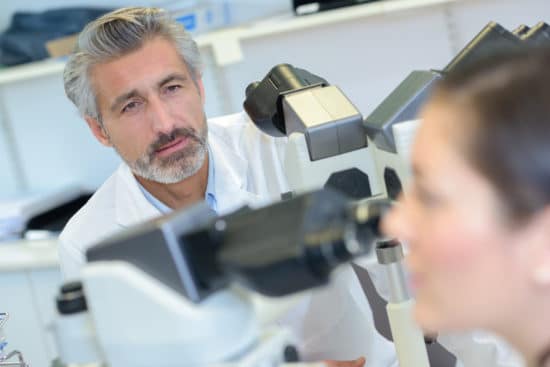Whether you’ve recently been promoted to lab manager or the position is one you’re considering, there’s a high chance the role may require skills and proficiencies you hadn’t even contemplated. Of course, a major part of the job is facilitating new discoveries and undertaking exciting research, but the work doesn’t end there. Take a look at the 10 skills we’ve identified that make a successful lab manager.
Quick Navigation
Being in a position of responsibility for the entire team can seem somewhat daunting when you’re first promoted to the role of lab leader but when you break it down into its constituent parts, it needn’t be. Consider the following three points and you’ll be well on your way to becoming a respected lab lead. Firstly, aim to make choices for the good of the whole. A position of power means the final decision sits with you so see to it that choices are made for the team and not the individual. Secondly, make confident choices. The lab manager needs to be willing and able to make critical decisions and to inspire the team with their well thought out, logical judgements. Finally, maintain motivation and enthusiasm amongst your team. Listen to your staff, ensure everyone is aware of their goals and targets and see to it that employees are working together for the good of the lab.
Both formal and informal communication are vital for ensuring great team morale and a successful working atmosphere. Be sure to schedule in regular one-to-ones with staff so they have the opportunity to discuss any issues with you before they turn into problems. An approachable and understanding manager is regularly listed as one of the key factors in employee morale. And, if you’re looking for added super boss points, arrange informal meet-ups to allow colleagues to have fun together outside of what can be an intense working environment.
The role of lab manager has many crossovers with that of project manager. Of course, the completion of a project is a group effort and oftentimes it wouldn’t be possible without the rest of your team but bringing together the many elements of a complex project will largely fall on the shoulders of the lab manager. Whether you’re setting timeframes, communicating goals to the rest of the project team or ensuring delivery, project coordination is key to success and you’re the person to do it.

Government funding is scarce and applying for grants and funding from various sources is key to a successful, thriving lab. The future of the lab itself may be on the line without adequate funding so this is one of the most vital tasks that you’ll undertake as lab manager. There are numerous courses that will help you improve your bid writing, or you could take the time to seek the advice of senior staff who have more experience in this field. But, don’t panic if you’re not a wordsmith, there are agencies that specialise in grant writing or you could hire a bid writer if the budget allows. Spending in this area often has a great return on investment so consider delegating the task if necessary.




Making sure that your lab’s meetings are worthwhile and productive can take a lot of work. Whether you are putting together agendas prior to the meeting, keeping the conversation focused during, or debriefing the team afterwards, organising meetings will take a lot of skill. It is good to watch how others conduct meetings and work on the skills that you find most effective in making meetings productive and useful to the entire team.
Managing Conflicting Priorities
Financial constraints and other commitments often mean that it isn’t possible to prioritise the research alone. An important skill for lab managers is the ability to juggle these conflicting priorities, ensuring the best quality research while maximising profit and appeasing investors. Science is about discovery and innovation, but an effective manager has to deliver these things on time and within budget.
Creative problem Solving
As the manager of the lab, you’ll regularly be required to think outside the box. After all, by the time the issue reaches you, it’s likely that all of the more obvious solutions have already been tried by the rest of your team. Whether it’s solving budget issues through imaginative workaround solutions or offering a fresh perspective on a project that has run out of steam, thinking outside the box is one of the many skills you’ll need to employ. Become a better creative problem solver by staying on top of industry news and advances in your field. With one eye on the bigger picture, you’re more likely to spot innovative solutions and be in a position to put them into action.
Skills Development
As lab manager, it’s also your role to oversee conferences and training for your team. Ensuring that your staff are up-to-date with the latest training and advances in your field is vital for a forward-thinking workforce. Join relevant scientific or trade organisations to stay on top of all the latest developments. Identify and prioritise which courses will be most beneficial to the lab as a whole and book accordingly. When budget is limited, it can be easy to overlook staff training and development, but it can pay dividends in terms of both staff morale and superior knowledge in the long run.
Safety supervisor
By their very nature, laboratory environments are full of hazards. From the chemicals stored to the processes undertaken, lab environments are inherently risky. It’s said that “safety is everyone’s responsibility” and of course this is true but as lab manager, it’s your duty to undertake the lion’s share of the work. Ensuring there are always clear safety guidelines, arranging safety training and promoting a clean, organised and safe place to work should be key considerations.
If you’ve only ever been an attendee at lab meetings before, then it could be easy to assume running a meeting is simply a matter of finding a time and setting the date, but experienced lab managers will know that there’s a lot more to it than this. From putting agendas together, allocating the right amount of time for the meeting itself, ensuring that it runs smoothly and debriefing the team afterwards, the role of meeting organiser is a vital one. If the role is new to you, it would be advisable to observe meeting leads and make a mental note of what they do well in order to replicate it.
If your lab needs an upgrade to make sure that it is running as efficiently as possible, our team at InterFocus can help. For more information about our bespoke fitted labs, visit our homepage or call our team on 01223 894 833.




